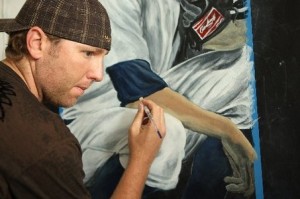As the years have worn on, Derek Jeter’s defense has been the topic of many an argument among Yankee fans. Some see his strong throws from the outfield grass and willingness to sacrifice his body on foul balls as a sign that he knows how to field his position. Others die a little on the inside every time Michael Kay says that the ball goes “past a diving Jeter.” He is not, critics contend, a very good defender.
For the most part, those critics are right. Jeter has never been a particularly stand-out fielder. His range has generally been below-average, and he has been able to compensate for his weak fielding by flashing above-average arm strength and a top-notch offensive prowess. The Yanks are OK with putting him at short because he has a career offensive line of .316/.387/.458 and over 2600 hits.
As Derek crept past his 35th birthday 11 days ago, the debate over his place on the field continues. At some point, he’ll have to move off short to a less important defensive spot on the diamond. With third and first base held down for the better part of the next decade, what that spot will be is anyone’s guess.
Jeter, though, will have none of it. In the Sunday conversation with Post writer Steve Serby, Jeter unequivocally objected to switching positions:
Q: Can you envision yourself playing another position for the Yankees than shortstop?
A: Can I envision? No.
Q: What if they asked you?
A: You’re speaking in all hypotheticals.
Q: I know.
A: I can’t answer that question.
Q: Anyway, I was listening to radio, and they were talking about maybe . . .
A: I don’t listen to the radio, so . . . wherever you’re going with that question, I don’t even want to hear it.
Q: But your last day as a Yankee, whenever that will be, you want to be at shortstop.
A: You asked me, “Can I envision myself playing another position?’ My answer to that question is no, I can’t envision it,” so . . .
I could almost read Jeter’s patience evaporating before my eyes. For now, though, Jeter can stay at short. Per Fangraphs, Jeter is having a decent-for-him defensive season. He has a positive UZR, and while his range factor is still at the bottom of the bunch, he defensive metrics are far better than they were a few years ago. (For more on these advanced defensive stats, review the Fangraphs Glossary.)
There is, however, one question to ponder: Should Yankee fans expect to win with a 35-year-old short stop? A few months ago, David Pinto tackled just that question and produced the following graph. It shows the total percentage of all plate appearances by age and position. Click it to enlarge.
As Pinto pointed out in April, it’s been a while since a team won the World Series with a 35-year-old short stop. Larry Bowa was 34 in 1980 when the Phillies captured their title, and he’s the oldest short stop on a World Series winner in the last 54 years. You have to go all the way back to the 1955 Brooklyn Dodgers and 36-year-old Pee Wee Reese to find a short stop older than Jeter who captured a ring.
That isn’t to say the Yankees can’t do it. As long Jeter hits as he’s been doing and plays at least close-to-average defense, the Yanks have as good a short as ever. After all, their title hopes rest more with their pitchers than with the short stop. As Jeter protests moving positions, though, history is not on his side.

